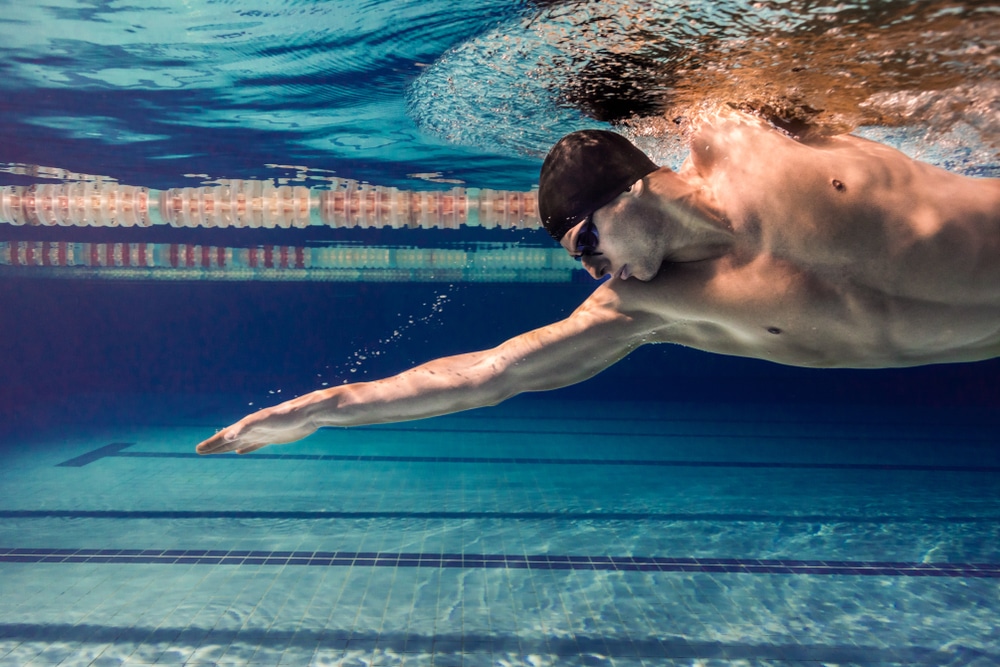For numerous adults, the idea of donning swim goggles can seem somewhat uncomfortable, especially when it appears that others can effortlessly open their eyes underwater without them. Hastily putting on a pair of goggles, only to find a snapped strap or overly tight eyecups, isn’t exactly a flattering look.
Nonetheless, it’s time to rethink the importance of goggles, even if they’re collecting dust at the back of your closet alongside your high school mementos.
You might not feel any discomfort right after opening your eyes underwater, but that doesn’t mean your eyes are safe from lasting damage. “There is no body of water that’s completely safe for you to open your eyes in without the risk of experiencing irritation, infection, or redness,” says Danielle Richardson, OD, an optometrist located in Los Angeles, California.
Despite having swum without goggles in childhood, experts continue to highlight their importance for safeguarding your eyes in aquatic environments. Below, they elaborate on the risks posed to your eyes and the actions to take if you have exposed them to water, especially for those who wear contact lenses.
What Risks Are Present When You Open Your Eyes Underwater?
Swimming in natural bodies of water like lakes, rivers, or oceans without protection is ill-advised due to several risks. These can include eye irritation, redness, dryness, and potential blurry vision, according to Dr. Richardson. Untreated water can harbor bacteria, viruses, sewage, or debris, which may lead to infections such as pink eye (conjunctivitis).
Don’t be misled by the apparent cleanliness or clarity of the water; dangers persist. Diane Hilal-Campo, MD, an ophthalmologist from Oakland, New Jersey, and the founder of twenty/twenty beauty, warns that even tap water contains microorganisms such as Acanthamoeba, which can result in severe eye infections like acanthamoeba keratitis, possibly resulting in permanent vision loss or blindness.
Sea water, with its higher salt concentration, can sting and further irritate your eyes compared to tear composition, explains Dr. Richardson. Moreover, small particles like sand can create minor scratches on your corneas.
Are chlorinated swimming pools any safer? Not necessarily. Even with routine cleaning and disinfection, pools still pose a threat. The chlorine meant for purification can irritate your eyes, causing redness. “There’s no guarantee with chlorine levels; they could be too high or too low,” notes Dr. Hilal-Campo. “Even at optimal levels, the chemicals can irritate the sensitive conjunctiva lining the eye, resulting in allergic reactions for some.”
Symptoms such as swollen eyelids, stinging sensations, and blurry vision could arise without visible skin reactions. Additionally, if a pool’s pH becomes more acidic due to contaminants like urine, your eyes could be at even greater risk.
Safe Underwater Swimming Practices for Open Eyes
Both Dr. Richardson and Dr. Hilal-Campo emphasize the critical role of goggles for safely opening your eyes underwater. “Wearing goggles is the only way to open your eyes underwater without discomfort or risk,” asserts Dr. Richardson. Fortunately, modern goggles are much more sophisticated, now offering UV protection and options for prescription lenses, adds Dr. Hilal-Campo.
If you plan to keep your face dry, you might be able to manage without goggles. However, you must make every effort to avoid having water splash into your eyes and rinse them thoroughly if any does, advises Dr. Richardson. (More details to follow!)
“There is no body of water that’s safe enough to open your eyes underwater without risk.” —Danielle Richardson, OD
What Actions to Take If You Must Open Your Eyes Underwater Without Goggles
If you find yourself needing to see underwater without goggles—perhaps to retrieve an item that has sunk to the bottom of a lake—attempt to minimize your exposure to the water. Dr. Richardson often shares this advice with her surfer clients and water sports enthusiasts.
If your eyes do contact water, she advises using preservative-free lubricant eye drops available at pharmacies to cleanse them thoroughly. “It’s vital to use these drops post-exposure to rehydrate your eyes and eliminate any foreign materials,” she explains.
Dr. Hilal-Campo recommends applying the lubricant eye drops every hour for about six hours. Dr. Richardson notes that eye irritation typically subsides following this treatment. However, if symptoms persist, an appointment with an eye doctor is necessary. For those who wear contact lenses, seeking immediate care from an eye specialist is crucial if any discomfort arises after water exposure.
If lubricant eye drops are not accessible, rinsing your eyes with regular water is not advisable due to possible bacterial contamination. “Only use solutions specifically formulated for eye care to mitigate the risk of infections,” says Dr. Richardson.
Considerations for Contact Lens Wearers
Contact lens users face a heightened risk of eye infections, according to Dr. Hilal-Campo. “The lenses can alter the eye’s surface, and frequent use heightens their susceptibility to infections.” Additionally, lenses can gather bacteria or chlorine, or may even become dislodged.
If you plan to partake in water activities while wearing contacts, choose daily disposable lenses and discard them immediately following your aquatic activities, even if you had goggles on. If you experience redness or irritation, it’s advisable to see an eye doctor promptly, Dr. Richardson suggests.
Final Thoughts
No aquatic environment is entirely safe for swimming with your eyes open, regardless of its outward clarity. Even disinfected waters can pose risks to your eyes due to chemical treatments. Therefore, it’s time to retrieve those long-neglected goggles, commit to using them, and confidently enjoy your time in the water.
































